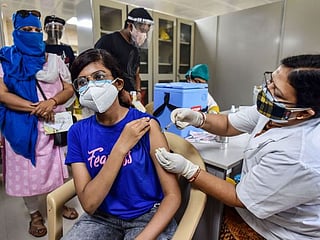COVID-19 second wave: Situation in India not hopeless, needs fightback
As the pandemic rages on, it has become hard to escape the virus of negative politics

In the doom and gloom which India is going through during this deadly second surge of the Coronavirus pandemic we were recently able to tune in to a different kind of positivity. Usually, when one uses the word “positive,” it spells bad news, someone has tested COVID-19 positive. But in a unique series of talks to buoy the public spirit, the Rashtriya Swayamsevak Sangh (RSS)’s Covid Response Team (CRT), organised a 5-day series called “Positivity Unlimited: Hum Jitenge (we will win).”
The impressive line-up of speakers included Sri Sri Ravi Shankar, progenitor of the worldwide movement, Art of Living; Sadhguru Jaggi Vasudev of Isha Foundation; Azim Hashim Premji, one of India’s most prominent investor-philanthropists and founder-chairman of tech behemoth, Wipro; Vijayendra Saraswati, Shankaracharya of Kanchi Matham; Jain Muni Acharya Vidyasagar; Gyandev Singh, Mahant of Nirmal Panchayati Akhara; Sonal Mansingh, danseuse, Padma Vibhushan, Member of Parliament; and Nivedita Bhide Vice President, Vivekananda Kendra, Kanyakumari.
The Convener of the CRT, Lt. Gen. Gurmit Singh (retired), said “motivating people and instilling confidence in society” while “setting aside fear, hopelessness, negativity” were the key drivers of this unique initiative.
The talks were aired on multiple media platforms from 4:30 to 5:00 each day from May 11th to 15th, culminating in the address of RSS Sarsanghchalak, Dr Mohan Bhagwat. I listened to latter’s broadcast live on Saturday afternoon, May 15th. It was so inspiring and uplifting that I spent the rest of the evening catching up on the earlier talks available on YouTube.
Finger pointing
In his message recorded from the US, Sadhguru asked with customary bluntness, “Do you want to be part of the solution or do you want to be part of the problem?” He urged us to think about “what are the sensible things to do” rather than “grandstanding” or trying “to point fingers at each other.”
He added, “Panic, frustration, fear, anger — none of these things are going to help us.” How are we going to come out this, is the key issue. “This is a time to stand up not even as one nation, but as one humanity,” he added, because we are at war, “against an invisible enemy.”
Sri Sri Ravishankar urged viewers not to succumb to anguish and despair: “Josh jagana, hosh sambhalana — awaken enthusiasm, get hold of yourself.” If you have faith in the Almighty, he said, it will help in times of distress. But the best way to deal with great grief is “to turn it into seva or service.” Helping others rather than focusing only on oneself can shift one’s consciousness and repurpose one’s life.
Sonal Mansingh, recovering alone from her terrible malaise said she had to overcome “Rib-racking phlegm” not to mention depression and hopelessness: “I thought I’d kick the bucket. It was all over. But I come out of it.” What was her secret? As she put it, “Meri apni kala,” her own artistry and skill as a great dancer.
The shortest lecture, lasting just a couple of minutes, was by billionaire IT-tsar, Premji: “Together we are stronger, divided we continue to struggle.” Moreover, he stressed, “We must act with greatest of speed on all fronts and these actions must be based on good science.”
What was the best way out of the pandemic? "Science and truth are the foundations on which we can tackle this crisis and ensure it’s not repeated.” He also reminded us of the “plight of the most vulnerable who stand devastated not only by the pandemic but also the economic fallout of the same.”
Positivity talk
In the concluding address, Bhagwat admitted that though he had been asked to speak on positivity, it was difficult to do so when many families had lost their loved ones, including primary breadwinners. But while nothing could be done about those already lost, we, the surviving, had to face the circumstances: “We don’t need negationism, to say that nothing happened and everything is fine …. We have to keep our minds positive, the bodies corona-negative.”
“After the first wave, we all became inattentive, whether the public, the government or administration. We knew, doctors were giving signals. But we all became negligent. Now, they are talking of a third wave. Do we have to be scared? No, we don’t have to be scared,” he said. Instead, “It is time to fight. We all must work as a team; assigning blame can come later.”
Bhagwat also warned people against those who create panic: “Do not believe unverified reports or unproven information.” He added that it is better to keep oneself busy during the pandemic, even strengthen families by spending more time together.
“The best thing is to help others, especially those who have lost their income or most in need during this difficult time.” He gave the people a motto to live by: “Success is not final, failure is not fatal. The courage to continue is the only thing that matters.”
In the highly charged atmosphere, it was to be expected that the series would immediately get politicised. Rahul Gandhi, Congress leader and scion of the Nehru-Gandhi dynasty, dubbed the whole exercise “a betrayal of the citizens” akin to “burying one’s head in the sand.” Crowing over his recent success in West Bengal, poll-consultant, Prashant Kishor, also slammed the exercise as “disgusting” and “propagandist.”
Having myself heard and found the talks elevating, I realised that in India one might escape the COVID-19 virus, but it was impossible to escape the “virus” of negative politics.









